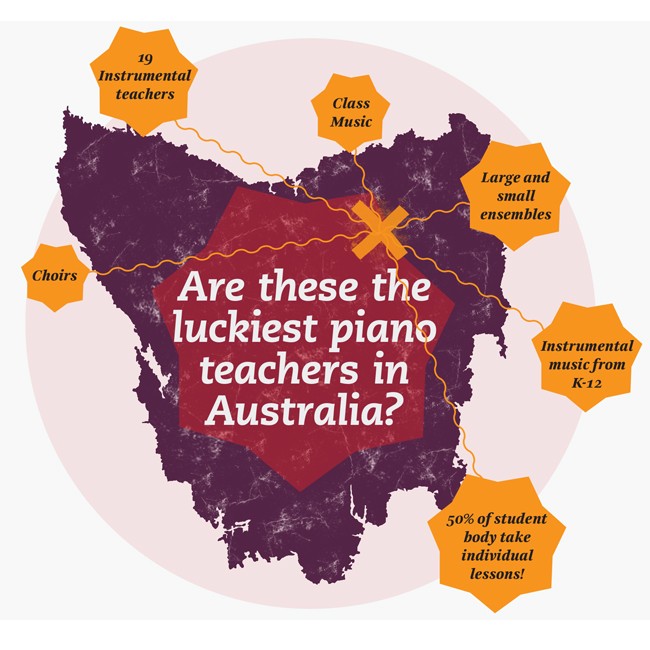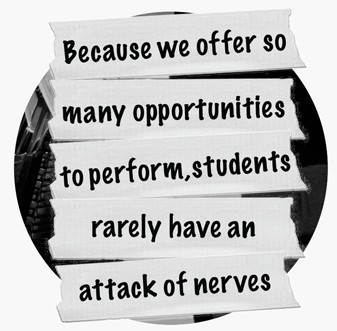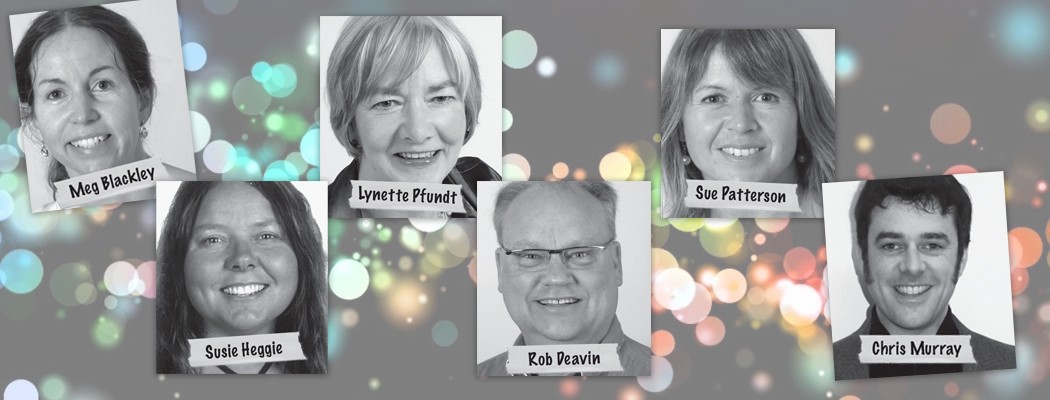We think we may just have found the luckiest teachers in Australia! We asked Meg Blackley, Lynette Pfundt, Rob Deavin, Chris Murray, Sue Patterson and Susie Heggie to tell us a bit about their piano program at Launceston Church Grammar School. They tell us that working in this idyllic milieu has helped them forge a strong friendship group and that they feel very lucky to work in such an environment.
[separator type=”thick”]

What are the best aspects of working in a team of piano teachers?
Discussing repertoire, or common problems that students have with the same pieces or technique. There is less isolation than our home studios. A feeling of team- ship.
Was it an accident that such a harmonious team came together at your school? Or was there a plan to employ teachers who fitted a certain philosophical approach?
Accidental? Yes and no. Our Head of Music wanted only suitably qualified staff, but the content of our lessons is entirely up to us. We do, however, have the same desire to give a well-rounded music education to our students and hopefully achieve that in our various ways.
How much do you coordinate your teaching approaches?
We don’t. Individual teachers have their own style & approach and are free to teach in their own way. We do, however coincide in some of our methods eg. Books, masterclasses, conferences.
How much do your students come into contact with each other “as pianists”?
Great question-this is the best bit! Our students come together at a plethora of both formal and informal musical events. It is wonderful to watch them be inspired by each other and choose role models.
The formal events include: assembly items (Rob Deavin organises a roster and Senior School students put their name down if they want to play in Chapel or assembly), friendly soirees (especially friendly audiences for beginners to build confidence in performance and etiquette), opportunities to accompany warm-ups in choir, exams, master classes, playing for the school musicals, stage band, end-of-year concerts, as well as solos, duets, trios and even piano quartets in the Launceston Competitions & St Cecilia Performance Challenge. The TCE students have a soiree arranged for them in which they present their entire programme in concert mode. If we have AMus or LMus students, they sometimes choose to have a concert so they can have a performance opportunity before their exam.
Casual ‘events’ include class performances (from 6yr olds right through to the Seniors), students form ‘bands’, they practice at each other’s houses. Best of all, we have lots of recess & lunch kids: our music building is open for students to practise in & many take this opportunity to share, enjoy and improvise informally. Duet and trio groups often turn into friendship groups and it is delightful to watch students inspire each other.
How much ensemble work do your students do because of your teaching arrangement?
Lots of duets and trios, also knowledge of each other’s students mean we know who to approach for certain needs (eg. a pianist to accompany a string ensemble, accompany choir etc).
Do you organise professional development specifically for your team of teachers?
We enjoy attending PD and often arrange to attend together, although there is no formal requirement to do so. Recent highlights include APPC, Christopher Norton, Dan Coates, Elissa Milne, Gayle Kowalchyk and the concert pianist Ambre Hammond.
Is there someone ‘in charge’, or is the working relationship hierarchy free?!
Very even. Entirely open and flexible. Apart from our Junior School timetables being arranged for us, no-one is in charge.
What is the single biggest advantage you’ve experienced working with a group of other piano teachers?
The conversations we have – asking each other for advice and the sense of collegiality.
Have the teachers in the group ended up specialising? For example, some teachers working with younger students, some teachers with a focus on musicianship aspects of pianism, some teachers being Baroque specialists, etc.
No. We do think about “best fit” when a new student commences with us. Sometimes a student or parent may ask for a particular teacher. Also we keep in mind the need of the student eg. learning style, gender, temperament etc. We believe that the student -teacher relationship is vital to the learning process. Both teacher and student are free to suggest a change if it is to the student’s advantage. We do consult each other if we have a particular problem eg. how would you interpret this ornament? etc.
What are the biggest benefits to piano students learning at the school of your team approach to piano teaching?
Because we offer so many opportunities to perform, students rarely have an attack of nerves – performing is really part of the culture and not considered at all out of the ordinary. They hear new repertoire at our soirees, at the comps or at master classes and are inspired to explore a huge range of music which they might possibly have not been exposed to if our programme were smaller and less diverse.

How much interaction with students outside the school do your students have?
We run the Grammar Music Academy from the school as well. Basically it means anyone outside the school can apply to have lessons from us. We teach older beginners, uni students – some parents of our students have chosen to have lessons and children from other schools also learn from us. It’s not uncommon for one of us to be teaching and another teacher will come in from next door and suggest forming a partnership between students from different schools and adults of varying ages. Our students also perform in master classes etc. where they meet many other piano students from around the area.
Has there been a wider community benefit to your approach to piano teaching within your team/school?
Some students and parents have learned about the Music Academy through comps, community performances, which has led to music friendships being forged and in a few cases, parents requesting lessons for themselves. Our students have been asked to perform at various functions, including weddings, School cocktail evenings, at nursing homes and, once, at the Art Gallery when the Monet ‘Haystack’ was on display.
In some ways, our students are our advertisement. Student retention is high and we encounter many tuition requests from older beginners of around the 14-16yr old age group. Music in Grammar has grown over the years and the School is recognised in the wider community because of its music programme. We were also fortunate enough to win the ABC Flame Awards several years ago.
